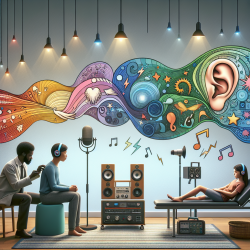In the field of speech-language pathology, particularly when working with children and adolescents, the importance of evidence-based interventions cannot be overstated. One notable study that has contributed significantly to our understanding of effective therapeutic approaches for adolescents experiencing unusual experiences is the CUES+ study. This randomized controlled trial investigated the effectiveness of cognitive therapy in reducing distress associated with unusual experiences in adolescents aged 12-18 years.
The study, titled Coping with Unusual ExperienceS for 12–18 year olds (CUES+): a transdiagnostic randomised controlled trial of the effectiveness of cognitive therapy in reducing distress associated with unusual experiences in adolescent mental health services: study protocol, offers valuable insights that can be directly applied to clinical practice. Here, we will explore the key outcomes of the CUES+ study and how practitioners can implement these findings to improve therapeutic outcomes for adolescents.
Key Findings from the CUES+ Study
The CUES+ study focused on adolescents presenting with unusual experiences, such as hearing voices or having unfounded suspicions, which are often distressing and impact their daily lives. The study compared the effectiveness of cognitive behavioral therapy for unusual experiences (CBT-UED) combined with routine care to routine care alone. Here are the key findings:
- Reduction in Emotional Distress: Adolescents who received CBT-UED in addition to routine care showed a significant reduction in emotional distress compared to those who received routine care alone.
- Improvement in Unusual Experiences: There was a notable decrease in the frequency and severity of unusual experiences among adolescents who underwent CBT-UED.
- Cost-Effectiveness: The study demonstrated that CBT-UED is a cost-effective intervention, providing significant benefits without a substantial increase in healthcare costs.
Implementing the Findings in Clinical Practice
Practitioners can leverage the outcomes of the CUES+ study to enhance their therapeutic approaches with adolescents experiencing unusual experiences. Here are some practical steps to consider:
- Incorporate CBT-UED into Treatment Plans: Given the proven effectiveness of CBT-UED, practitioners should consider integrating this approach into their treatment plans for adolescents presenting with unusual experiences. This involves providing up to 16 sessions, including individual and family support meetings.
- Focus on Emotional Regulation: The study highlights the importance of helping adolescents develop skills in affect regulation. Practitioners should incorporate techniques that assist adolescents in managing their emotions effectively.
- Tailor Interventions to Developmental Stages: It is crucial to adapt therapeutic interventions to the developmental stage of the adolescent. This includes making sessions engaging and relevant to their social and familial contexts.
- Engage Families in Therapy: Family support is a critical component of the CBT-UED approach. Practitioners should involve family members in the therapeutic process to address familial difficulties and enhance the overall effectiveness of the intervention.
Encouraging Further Research
While the CUES+ study provides a strong foundation for implementing CBT-UED, further research is necessary to continue improving therapeutic outcomes. Practitioners are encouraged to stay informed about the latest research developments and contribute to ongoing studies in the field. Engaging in research not only enhances clinical practice but also helps in the advancement of the field of speech-language pathology.
To read the original research paper, please follow this link: Coping with Unusual ExperienceS for 12–18 year olds (CUES+): a transdiagnostic randomised controlled trial of the effectiveness of cognitive therapy in reducing distress associated with unusual experiences in adolescent mental health services: study protocol.










